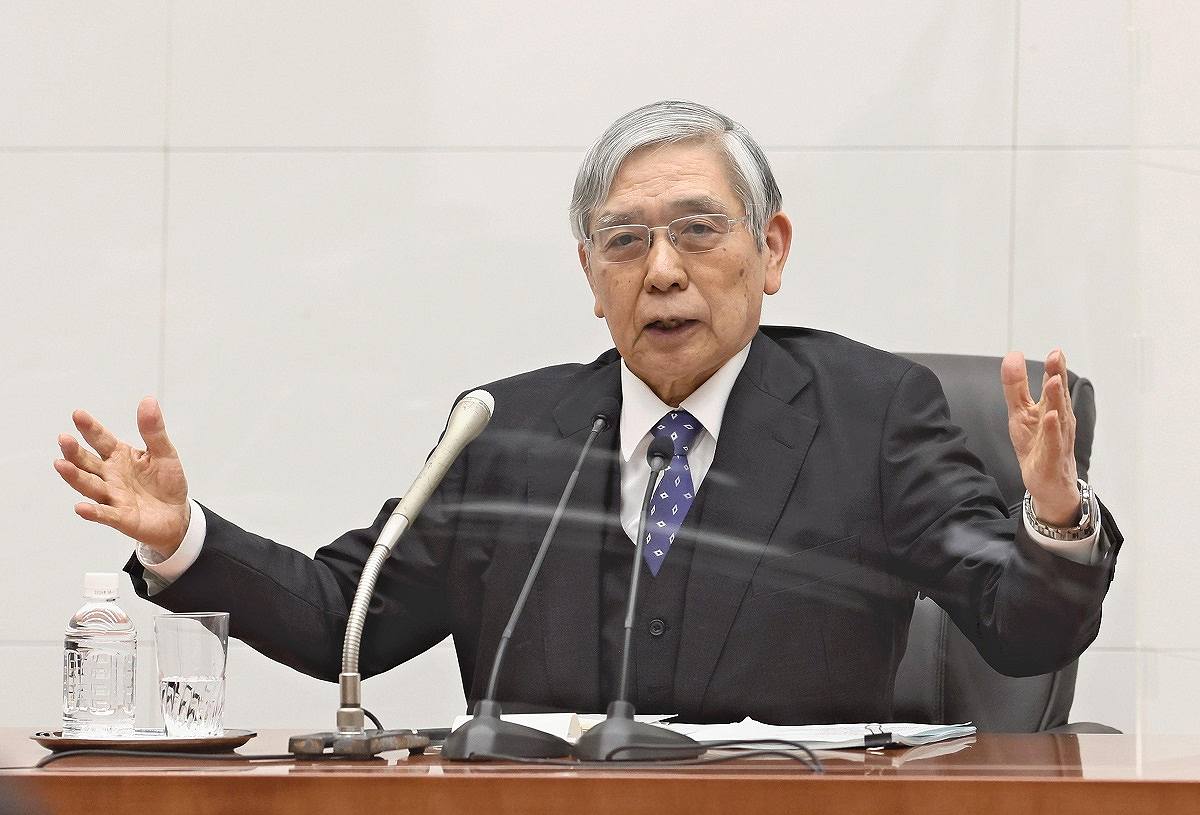
Bank of Japan Gov. Haruhiko Kuroda speaks at a press conference at the BOJ’s head office on Friday.
10:15 JST, March 14, 2023
TOKYO (Jiji Press) — Bank of Japan Governor Haruhiko Kuroda will end his 10-year tenure at the helm of the central bank April 8 without hitting its inflation target despite his monetary policy experiment.
Kuroda, the longest-serving BOJ governor, stretched the limits of monetary policy by taking aggressive measures, including an unprecedented long-term interest rate target.
His successor, economic scholar Kazuo Ueda, will take on the tough job of attaining the 2 pct inflation target while finding a way out of the unorthodox policy amid increasing negative side effects from the policy.
Adamant about drastic easing
“I did what must be done,” Kuroda told a press conference Friday after his final BOJ policy meeting. Reflecting on his 10 years in office, he emphasized what he achieved through the policy measures taken during the period.
At his inaugural press conference in March 2013, Kuroda expressed his confidence that the bank would attain the 2 pct target in about two years, saying that the goal “must be achieved through bold monetary easing.”
In the following month, Kuroda introduced “monetary easing of a different dimension” featuring huge Japanese government bond purchases. The move was later called “Kuroda’s bazooka” among financial market players.
The drastic action sent Japanese stocks higher and pushed down the yen against the dollar.
Kuroda adamantly pursued monetary easing.
When Japan came under fresh deflationary pressure after a consumption tax hike in 2014, Kuroda stressed his resolve to reach the inflation target.
He even quoted from the story of Peter Pan in 2015, saying that “the moment you doubt whether you can fly, you cease forever to be able to do it.”
In 2016, the BOJ introduced a negative interest policy and then launched what it calls yield curve control with a negative short-term interest rate target and a long-term JGB yield target, an unprecedented central bank measure.
Kuroda “never wavers once he makes up his mind. His stability is outstanding,” a former BOJ official has said.
The BOJ under Kuroda was a driving force for the late former Prime Minister Shinzo Abe’s reflationary policy mix dubbed “Abenomics.”
However, negative side effects from the BOJ’s unorthodox policy measures have grown evident, overshadowing the final years of his tenure.
Legacy or burden?
Among them was the rise in raw material prices worsened by Russia’s invasion of Ukraine.
Amid soaring food prices, Kuroda came under fire for saying in a speech in June last year that household tolerance to price rises was increasing. He had to retract the remark and apologize before the Diet, the country’s parliament.
The BOJ held its ultraeasy monetary policy steady while U.S. and European central banks raised interest rates to reverse their crisis-mode policies. This caused the yen to dive, which in turn pushed up Japanese import prices further.
Concerns have spread over the BOJ’s policy rigidity.
At Friday’s press conference, Kuroda said the BOJ’s monetary policy has been “effective and sustainable” in the last decade. But the negative side effects are accumulating.
The BOJ’s massive bond buying has more than quadrupled its JGB holdings from ¥125 trillion to over ¥580 trillion over the 10 years, which now make up half of all outstanding JGBs.
Kuroda said he does not consider it a negative legacy, but it is not easy to reduce the JGB holdings without causing an interest rate spike. The task will be passed to Ueda.
In addition, the yield curve control has deteriorated the functioning of the bond market.
Naomi Muguruma, chief bond strategist at Mitsubishi UFJ Morgan Stanley Securities Co., said Ueda “may move to revise the policy, such as by ditching the long-term rate target, between April and June.” Such a move could spark another round of JGB selling by speculators.
The BOJ “should take seriously its failure over the 10 years to boost inflation,” said Hideo Kumano, economist at Dai-ichi Life Research Institute Inc. “It has been proven that what monetary policy can do has its limits.”
“The first thing [for Ueda] to do is to normalize interest rates,” Kumano said.
On the political front, BOJ attempts to pursue policy normalization are expected to rekindle a spat between Abenomics proponents and skeptics in the ruling Liberal Democratic Party.
Top Articles in Business
-

Prudential Life Insurance Plans to Fully Compensate for Damages Caused by Fraudulent Actions Without Waiting for Third-Party Committee Review
-

Narita Airport, Startup in Japan Demonstrate Machine to Compress Clothes for Tourists to Prevent People from Abandoning Suitcases
-

Japan, U.S. Name 3 Inaugural Investment Projects; Reached Agreement After Considerable Difficulty
-

Toyota Motor Group Firm to Sell Clean Energy Greenhouses for Strawberries
-

SoftBank Launches AI Service for Call Centers That Converts Harsh Customer Voices into Softer Voices
JN ACCESS RANKING
-

Japan PM Takaichi’s Cabinet Resigns en Masse
-

Japan Institute to Use Domestic Commercial Optical Lattice Clock to Set Japan Standard Time
-

Israeli Ambassador to Japan Speaks about Japan’s Role in the Reconstruction of Gaza
-

Man Infected with Measles Reportedly Dined at Restaurant in Tokyo Station
-

Videos Plagiarized, Reposted with False Subtitles Claiming ‘Ryukyu Belongs to China’; Anti-China False Information Also Posted in Japan




















